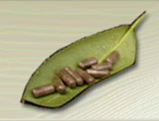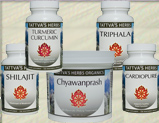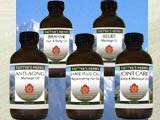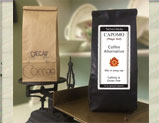 Loading... Please wait...
Loading... Please wait...Co2 Full Spectrum Holistic Herbs
Blog - General Health Information Ayurvedic Guggul
Guggul – One Amazing Herb
Posted on 22nd Jun 2012
Guggul is a flowering plant in the family Burseraceae. The guggul plant may be found from northern areas of Africa to central Asia, but is most commonly found in northern India. It is made from the sap (gum resin) of the commifora mukul tree. This tree has been a key component in Ayurvedic medicine for centuries. In the ancient Ayurvedic texts, dating back 3,000 years in India, The extract of this gum, called guggulipid, or guglipid has been recommended for arteriosclerosis, or “hardening of the arteries”. Today, the gummy resin is being used for several other problems, such as arthritis, acne & other skin diseases, high cholesterol, and weight loss. Guggul contains substances that have been shown to lower blood cholesterol and triglycerides. One of these substances also decreases the redness and swelling that occurs in some types of acne.
Studies have shown that guggul may not be as effective in lowering cholesterol and triglycerides in the blood of people who are eating an unhealthy Western diet. Interestingly, guggul does seem to be truly effective in Indian populations, who eat a different type of diet altogether. The typical vegetarian diet in India, with fresh fruits and vegetables, and the spices commonly used in many curried dishes (ie: turmeric, mustard seeds, cayenne, cumin, ginger, etc.) seem to play a big role in enhancing and receiving the benefits of guggul. Among people in this group, those taking guggul, along with a regular exercise regime seem to respond with lower total cholesterol, “bad cholesterol” levels (LDL cholesterol), and other blood fats called triglycerides.
The resin of the guggul plant, known as gum guggulu, has a fragrance similar to that of myrrh and is commonly used in the making of incense, soaps and perfumes.
Guggul is possibly safe for most people. It has been used safely in clinical trials for up to 48 weeks. Some evidence also suggests that long-term use- up to 75 weeks may be safe and beneficial.
Tattva’s Herbs natural supplements combine the wisdom of Mother Nature with the very latest technology known as supercritical extraction. This state of the art technology delivers a very pure extract that is both full spectrum and extremely concentrated at the same time. It is so pure that you can actually smell the qualities of the original herb in the extract, and you are greeted with this aroma when you open a bottle. It is sweet and powerful. There is simply no other extraction method so effective that you can actually smell the purity, fragrance and essence of the herb. This is a testimony to the great care that goes into the selection of the herbs and the supercritical extraction process itself. To give you an idea of the potency and concentration of the extract, we can often use as much as 200 to 250 pounds of fresh herbs to produce just one pound of supercritical extract. All of the herbs are grown on organic farms and selected with the greatest of care. The supercritical process produces an exceptionally broad representation of the herbs’ active constituents, which oftentimes traditional methods of extraction cannot even begin to extract. Furthermore, the supercritical process does not use any chemical solvents at all. Instead, it utilizes safe and environmentally friendly carbon dioxide, the same carbon dioxide that is found in your sparkling water.
Finally, the supercritical extract, post-supercritical extract (PSE) (a water-soluble extract), and the raw whole herb are combined to create our herbal formula. The finished product is superior in terms of both freshness and breadth of active constituents. It delivers the full spectrum of the herbs with a potency that cannot be surpassed. In addition, all of the herbs are independently tested for heavy metals and other contaminates. The result is an exquisite formula that delivers simplicity, purity and incredible potency all at once.
There are a few rare side effects that have been reported with the use of guggul such as stomach upset, headaches nausea, loose stools or diarrhea , belching, and hiccups. Guggul can also cause allergic reactions in some sensitive people with symptoms such as rashes and itching. These adverse reactions are more common with those taking higher doses, such as 6000 mg per day.
Click here for Tattva’s Herbs Guggul















